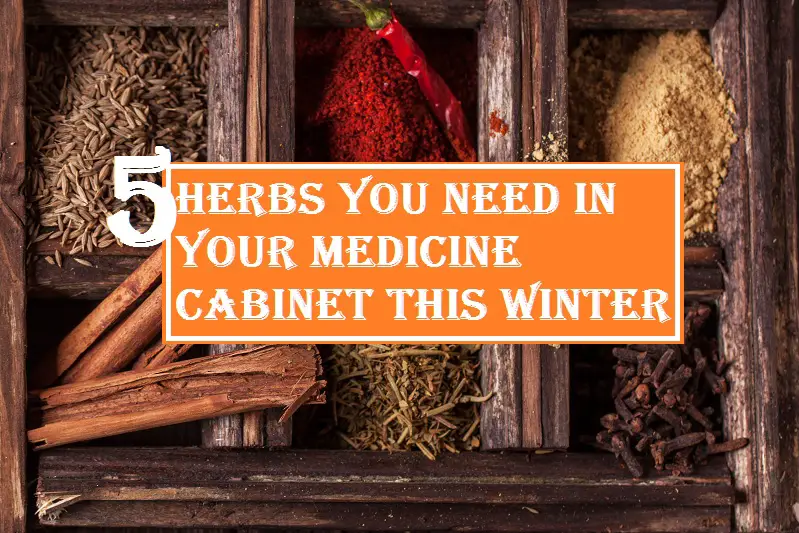With the winter months comes cold and flu season, and probably multiple trips to the doctor.
You may be accustomed to spending considerable sums of money at the pharmacy during this season, but there are actually herbal remedies that can help you to fight off illness naturally.
Read on to learn about five herbal medicines that will help you to stay as healthy as possible this winter.
Ginseng
Ginseng can keep you healthy this winter.
Researchers writing for a 2011 publication of Evidence-Based Complementary and Alternative Medicine reviewed the results of five different studies that analyzed the effects of ginseng, and they concluded from the research that ginseng is more effective than a placebo is for reducing the number of colds people experience.
They also determined that the research shows that ginseng reduces the length of a cold by an average of about 6 days [1].
Based on this research, taking a ginseng supplement during the winter could lower the number of colds you catch, and if you do happen to get a cold, it could pass more quickly with ginseng.
To derive the greatest benefit from this herb, it is probably necessary to take it consistently throughout the winter months; the studies reviewed for Evidence-Based Complementary and Alternative Medicine typically involved 12-16 weeks of ginseng supplementation.
Elderberry
Elderberry is well-known for its healing properties in cases of cold and flu, and the research has proven its effectiveness.
In a 2009 study in the Online Journal of Pharmacology and PharmacoKinetics, medical scientists from Shanghai Construction Technical College in China evaluated the efficacy of a lozenge that contained elderberry on people suffering from flu symptoms.
They compared the lozenge to a placebo, and found that after two days, 28 percent of the patients who took the elderberry lozenge had completely recovered from flu symptoms, and 60 percent of them had recovered from most symptoms and only had a few mild symptoms remaining.
None of the patients in the placebo group recovered completely after two days; only 16 percent had some improvement, and many of them actually experienced a worsening of flu symptoms.
Not only was the elderberry extract effective for relieving flu symptoms; it was also found to have no side effects [2].
Elderberry can therefore serve as a useful treatment for flu symptoms, without any of the unwanted effects seen with pharmaceuticals.
Marshmallow Root

If you’re plagued with a cough this winter, the herb marshmallow root could provide relief.
A 2009 study in the International Journal of Biological Macromolecules found that marshmallow root had a cough suppressant effect similar to that of the opiate codeine [3].
Marshmallow root, which is available as a supplement in capsule form, is a natural cough medicine.
Since cough is typically a symptom associated with cold and flu, having marshmallow root on hand at home during the winter season is a wise idea.
Echinacea
If you’ve done any research on herbal medicine, you’ve likely heard of Echinacea.
Researchers have conducted numerous studies to determine the effectiveness of this herb, and the results have been promising.
In 2007, researchers writing for the journal The Lancet Infectious Diseases reviewed the results of 14 studies that evaluated the effects of Echinacea, and they found that Echinacea supplementation significantly lowered the risk of catching a cold and reduced the duration of the cold [4].
Taking an Echinacea supplement could keep you healthy this winter, based upon this finding.
Ginger
Ginger is another herbal medicine that can be useful during the winter cold and flu season, as it could fight against illnesses.
Scientists from the Cross River University of Technology in Nigeria conducted a study with ginger for publication in a 2009 edition of the Global Journal of Pure and Applied Sciences.
They found that ginger had antibacterial effects and could be effective for treating bacterial illnesses [5].
Keeping ginger on hand will leave you prepared should you develop a bacterial infection.
In Conclusion
Ginger and other herbs, including Echinacea, marshmallow root, elderberry, and ginseng, can fight infection and provide symptom relief in cases of illness, such as cold and flu.
These herbs can serve as natural treatments for cold and flu and can be used in place of pharmaceutical drugs.
If you have questions about the safety of herbal medicines, you should discuss them with a doctor or alternative medicine specialist.
Please also check are daffodils edible.
Leave Feedback: Was this article helpful?

